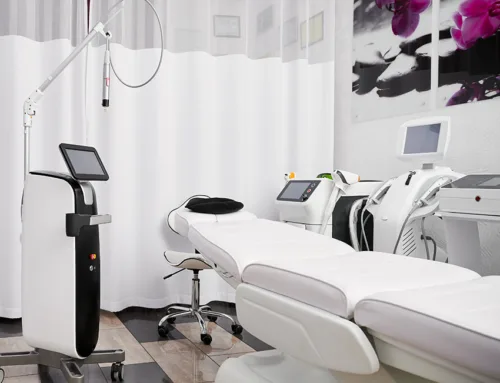Proven Healthcare Industry Marketing Strategies for Success
Healthcare industry marketing uses targeted strategies like digital optimization and multichannel engagement to attract and retain patients. This article explores these tactics, their benefits, and best practices to boost healthcare organizations’ visibility and patient loyalty.
Key Takeaways
- Healthcare marketing is essential for patient acquisition and loyalty, requiring a deep understanding of the target audience and effective communication strategies.
- Implementing a multichannel marketing approach and optimizing digital presence significantly enhance patient engagement and brand awareness in the competitive healthcare sector.
- Emerging technologies such as AI and telehealth are transforming healthcare marketing, necessitating adaptation to modern consumer behaviors and preferences for sustained success.
Understanding Healthcare Industry Marketing
Healthcare marketing is a strategic approach designed to attract and retain patients by fostering meaningful connections. Its primary focus is on identifying target audiences, understanding their needs, and effectively communicating the value of healthcare services. In an era where patients actively research and choose healthcare providers, having a well-crafted marketing strategy is critical for staying competitive.
Successful healthcare marketing goes beyond simple promotion. It creates opportunities to address patient concerns, build trust, and improve patient engagement. By understanding diverse demographics, from large hospital systems to independent clinics, healthcare organizations can craft strategies that resonate and deliver value to the right audience through the most effective channels.
Benefits of Effective Healthcare Marketing Strategies
Marketing strategies in healthcare are designed to broaden the scope of engagement, draw in new patients while maintaining current ones, and boost both visibility and brand recognition. They aim to establish a patient-focused approach that not only involves but also informs patients about their health management.
Enhancing Patient Experience
Delivering exceptional patient experiences is a cornerstone of effective healthcare marketing. Superior communication, personalized interactions, and readily accessible information build trust and foster long-term loyalty. From follow-up communications to appointment reminders and personalized greetings, thoughtful engagement strengthens relationships and encourages positive word-of-mouth.
Health systems can leverage technology to further enhance the patient journey. By analyzing consumer data, they can craft tailored messaging and implement omnichannel strategies that address individual needs. For example, telehealth services provide convenient access to care for patients preferring remote consultations, expanding accessibility and satisfaction.
Centralizing patient data through tools like a Customer Relationship Management (CRM) system enables healthcare organizations to streamline operations and deliver highly individualized care. This approach not only improves patient interactions but also ensures a cohesive and consistent experience across all touchpoints, reinforcing trust and loyalty.
By prioritizing patient engagement and integrating technology-driven solutions, healthcare providers can create a seamless, personalized, and impactful experience that meets the evolving expectations of today’s healthcare consumers.
Building a Strong Brand Identity
In today’s competitive market, healthcare organizations must establish a distinct brand identity to stand out. Highlighting quality achievements and maintaining consistent messaging helps build trust and credibility among patients, which are essential for fostering loyalty.
An effective healthcare marketing strategy ensures consistent messaging across all channels while delivering compelling content that resonates with the target audience. This approach not only strengthens brand presence but also reduces acquisition costs and improves ROI by effectively engaging patients.
By focusing on strategic branding within a well-executed healthcare marketing strategy, organizations can create a lasting impact and ensure their services remain visible and trusted in the evolving healthcare landscape.
Leveraging Data-Driven Insights
Analyzing patient data helps healthcare organizations develop informed strategic decisions for their marketing efforts. This approach allows them to focus on particular demographics, adjusting their strategies according to the preferences and behaviors identified, which ensures every engagement is impactful.
By allocating resources efficiently and refining marketing efforts through data insights, healthcare organizations achieve improved outcomes and greater coherence in their marketing strategies.
Key Components of a Successful Healthcare Marketing Strategy
A successful healthcare marketing strategy includes several critical components: optimizing digital presence, utilizing a multichannel approach, and leveraging content marketing. Each element is crucial for enhancing a healthcare organization’s visibility, maintaining competitive advantage, and effectively reaching the target audience.
Digital Presence Optimization
A healthcare website is often the primary interaction point for patients. It should be mobile-friendly, visually appealing, and responsive to improve user experience and search engine ranking. A seamless interface and interactive elements are essential for engaging patients and providing a smooth experience.
Search engine optimization (SEO) is vital for improving website visibility in search results. Slow loading times can result in lost patients, as they expect fast and efficient sites. Therefore, maintaining optimal site speed is critical for a strong online presence.
Online reputation management is another key factor, as patients rely heavily on online reviews when choosing healthcare providers. A positive online reputation significantly influences patient acquisition and retention.
Multichannel Marketing Approach
Healthcare organizations can expand their reach by implementing diverse marketing channels. A multichannel strategy allows them to connect with patients at every stage of their healthcare journey, providing continuous engagement across all aspects of healthcare practices.
Incorporating both organic and paid social media strategies increases brand awareness and strengthens relationships with patients. Digital marketing efforts should focus on patient engagement through various platforms like social media and email campaigns.
Content Marketing in Healthcare
Effective content marketing uses various formats such as blogs, videos, and infographics to educate and engage patients. Blog posts, educational videos, targeted emails, and gamification contribute to a comprehensive content marketing strategy.
Healthcare marketers should leverage clinical data and consumer behavior data to create personalized marketing messages. By analyzing these data sources, marketers can ensure that their content resonates with the target audience and addresses their specific needs.
Video Marketing in Healthcare
Video marketing is a powerful tool for healthcare organizations and providers to build trust and showcase their expertise. Doctors, clinics, and healthcare practices can use video content to offer valuable insights, answer frequently asked questions, or provide updates on services. Videos allow healthcare providers to connect with patients in an authentic and accessible way.
Unlike traditional text-based content, video delivers information in a more engaging and digestible format. It enables healthcare professionals to explain complex medical topics or procedures in simple terms, making it easier for patients to understand and retain the information.
By incorporating video marketing into a broader content strategy, healthcare providers can increase patient engagement, establish authority in their field, and ultimately drive patient loyalty.
Best Practices for Healthcare Marketing Implementation
Aligning marketing strategies with broader organizational goals not only strengthens marketing efforts but also enables more efficient budget allocation, guided by analytical insights. By utilizing healthcare-specific metrics, aligned with key performance indicators (KPIs), and evaluating return on investment (ROI), organizations can clearly measure the effectiveness of their marketing initiatives.
Personalization and Targeting
Personalized experiences are becoming a focal point in healthcare marketing to meet evolving consumer expectations. Understanding patients’ needs and expectations is crucial for improving their perceptions of healthcare services in medical practices.
Artificial intelligence (AI) is increasingly leveraged in healthcare marketing to enhance patient engagement. AI-driven tools can personalize communication and automate responses, making healthcare marketing initiatives more efficient and targeted.
Patient journey mapping is an essential practice in healthcare marketing, outlining the path a patient takes after their first engagement. Marketing automation allows for personalized communications via email, social media, and paid advertising campaigns, boosting engagement and retention rates.
Consistent Messaging Across Platforms
Maintaining consistency in tone, style, language, and core messaging across all platforms is key. Adhering to brand messaging guidelines fosters trust and recognition, which are vital to the success of any healthcare marketing campaign.
Integrating strategies across multiple channels is critical for maintaining cohesive branding and impactful communication in healthcare practices. When all platforms consistently reflect the brand, it amplifies the effectiveness of marketing tactics and simplifies the process of attracting new patients and retaining existing ones.
Monitoring and Adjusting Campaigns
It is crucial for healthcare marketers to measure indicators such as website traffic and user engagement levels when refining their marketing strategies within the sector. Essential performance metrics include email open rates and click-through rates of advertisements. By keeping an eye on these measurements, healthcare marketers can discern which tactics are effective and which require modification.
To gauge the success of a healthcare marketing strategy, it is crucial to monitor patient activities, such as booking appointments or fulfilling prescriptions. By analyzing ROI and other analytical data, healthcare organizations can verify that their marketing efforts are in line with organizational goals and achieve the anticipated results.
Addressing negative consumer feedback promptly demonstrates a commitment to resolving issues and improving services. Viewing poor reviews as opportunities for growth helps refine future campaigns. Using AI tools to analyze call tracking data and auditing responses at call centers further enhances financial decisions related to marketing and identifies factors contributing to missed opportunities.
Challenges in Healthcare Marketing and How to Overcome Them
The healthcare marketing field faces numerous challenges such as siloed departments, outdated strategies, and constrained budgets. It is essential for professionals in this sector to recognize these issues and devise effective strategies to remain competitive.
In this section, we explore key challenges faced by healthcare marketers and offer actionable strategies to overcome them.
Navigating Regulatory Compliance
Healthcare marketers must fully understand the implications of HIPAA regulations on their marketing strategies. HIPAA protects patient health information, making it essential to exercise caution when collecting and using data.
To remain compliant, healthcare organizations should limit the data gathered via landing page forms to basic contact details such as names and email addresses. Regularly reviewing marketing tactics ensures adherence to regulations while maintaining flexibility in promotional efforts.
Budget Constraints
Budget limitations can hinder healthcare marketing efforts, making it challenging to effectively engage and attract patients. Marketers need to be resourceful and strategic to optimize their impact with limited funds.
By focusing on cost-effective strategies such as digital marketing and targeting high-ROI channels, healthcare organizations can sustain patient engagement without exceeding financial constraints. Thoughtful planning and execution allow marketers to achieve their goals even with a restricted budget.
Keeping Up with Technological Advancements
Staying ahead in the healthcare marketing space requires embracing new technologies. Innovations like artificial intelligence (AI) and machine learning are reshaping the way healthcare organizations engage with patients, offering personalized and efficient marketing solutions.
By adopting these technologies, healthcare marketers can enhance patient engagement, deliver more tailored services, and improve operational efficiency. To stay competitive, it’s essential to continually adapt marketing strategies and leverage technological advancements.
Future Trends in Healthcare Marketing
To stay competitive in healthcare marketing, organizations must continually adapt to evolving consumer behaviors and emerging technologies. Trends such as voice search, artificial intelligence (AI), and telehealth are expected to redefine patient engagement, and it’s essential for marketing strategies to integrate these advancements.
Telehealth and Virtual Care
In the realm of healthcare marketing, there has been a noteworthy rise in telehealth services post-pandemic. These services now represent around 17% of all patient consultations in 2023, a substantial jump from the mere 0.1% recorded in 2019. The incorporation of telehealth into healthcare marketing strategies is gaining traction as it appeals to patients and enables virtual consults along with remote care offerings, thereby becoming an essential element within modern healthcare promotional activities.
Highlighting telehealth options within marketing initiatives aligns with patient preferences by underscoring the ease and availability of receiving care virtually. Such an adaptation among marketing efforts mirrors the evolving nature of how health services are provided and what today’s patients anticipate from their medical experience.
AI and Machine Learning
Artificial intelligence (AI) and machine learning (ML) are revolutionizing healthcare marketing by enabling personalized experiences at scale. These technologies allow organizations to analyze vast amounts of data, uncovering patient preferences and behaviors to create more effective and targeted marketing strategies.
AI-powered tools also automate routine tasks, streamlining marketing workflows and allowing teams to focus on higher-level strategies. While the use of AI and ML brings tremendous opportunities, it also requires careful attention to data privacy and security, along with skilled professionals to manage and optimize these technologies.
Voice Search and Smart Devices
The increasing use of voice-activated devices is reshaping how patients search for healthcare information. As voice search becomes a common method for patients to access services and information, healthcare organizations must optimize their digital presence to accommodate these shifts in behavior.
To ensure visibility in voice search results, healthcare providers should focus on conversational language and long-tail keywords in their digital content. These adjustments improve search rankings, enhance patient engagement, and make healthcare services more accessible to those seeking information through smart devices.
Case Studies of Successful Healthcare Marketing Campaigns
Healthcare organizations have demonstrated the power of strategic marketing through campaigns that effectively increase patient engagement and build trust.
One notable campaign leveraged social media platforms such as Facebook and Instagram to boost patient involvement. By utilizing targeted ads and engaging content, the campaign successfully reached a broader audience while fostering meaningful interactions with potential patients.
In another case, a healthcare provider aimed to enhance brand recognition by sharing patient testimonials and stories of successful treatments across multiple social media channels. This approach not only established credibility but also highlighted the organization’s commitment to exceptional care, strengthening its reputation in the industry.
The success of these campaigns was rooted in personalized communication strategies and a comprehensive omnichannel approach. By combining email marketing, social media outreach, and content marketing, these organizations tailored their messages to meet the specific needs and preferences of their audiences. This approach maximized engagement, increased satisfaction, and showcased the impact of thoughtful, patient-centric marketing.
Summary
Effective healthcare marketing strategies are essential for expanding reach, attracting new patients, and maintaining existing relationships. By focusing on improving patient experiences, building strong brand identities, and leveraging data-driven insights, healthcare organizations can significantly enhance their market position and visibility. Key tactics like enhancing online presence, adopting a multi-channel marketing approach, and capitalizing on content marketing are vital for success.
As the future of healthcare marketing evolves with telehealth, AI analytics, and voice search technologies, marketers must adapt to these changes to stay competitive. Addressing challenges directly and keeping up with new trends will help ensure marketing efforts align with organizational goals.









